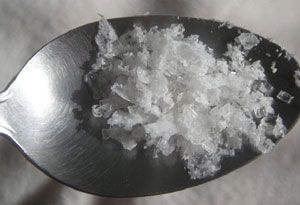That’s the intention of Canada’s federal government.
Namely, to include methylenedioxypyrovalerone (MDPV), a synthetic substance that causes stimulant-like psychoactive effects, in Schedule I of the Controlled Drugs and Substances Act. At least that’s the proposal formally announced in the Canada Gazette on June 9, 2012. This follows Health Minister Leona Aglukkaq’s announcement that the drug would be banned because of “recent media reports [that] have linked the use of ‘bath salts’ to violence causing harm.” Interested parties have until July 8, 2012 to comment (details below).
 As the Canadian Centre on Substance Abuse so carefully noted, “bath salts are not salts that go in your bath.”
As the Canadian Centre on Substance Abuse so carefully noted, “bath salts are not salts that go in your bath.”
Rather, it’s the common name given to MDPV, one of the possible ingredients in a substance available for sale, but as of yet, not regulated in Canada, unlike many of its amphetamine-like cousins already prohibited in Schedule III.
The government’s claim that bath salts are linked to violence stems from highly sensationalistic reporting of a tragic assault case in Miami where a man was shot and killed by police while apparently eating the face of another man. Miami police officials speculated that this attack was caused by the use of bath salts, though toxicology tests won’t be ready for a few weeks. Nor do they care that the man at the centre of this story had a history of violence, according to Kate Heartfield in the Ottawa Citizen.
The move to ban MDPV comes amid a news cycle in which numerous stories purport to detail the effects of its use, including a segment of CBC’s The Current with Anna Maria Tremonti on May 30th. The Current marshaled interviews from Halifax with a former bath salts user and an addictions treatment doctor to underscore the supposedly uniquely dangerous effects of this drug and give it a homegrown spin. Sound familiar? It should. Similar “drug scare” narratives have been constructed around the popularization of numerous substances, including crystal meth, PCP, crack, speed, LSD, heroin, reefer and of course, opium.
 The rush to ban MDPV and place it in Schedule I will mean that the harshest drug law penalties can be applied to people who use, traffic or produce this drug. As researchers have noted, the banning of drugs like Mephedrone often drives its use and manufacture further underground, inflates the price and prevents the implementation of potentially helpful forms of regulation. Prohibiting substances has not made people safer, and has not resulted in the elimination of drug use. It can also displace drug use back to traditional illegal drugs, or to newer, potentially more dangerous “legal highs.”
The rush to ban MDPV and place it in Schedule I will mean that the harshest drug law penalties can be applied to people who use, traffic or produce this drug. As researchers have noted, the banning of drugs like Mephedrone often drives its use and manufacture further underground, inflates the price and prevents the implementation of potentially helpful forms of regulation. Prohibiting substances has not made people safer, and has not resulted in the elimination of drug use. It can also displace drug use back to traditional illegal drugs, or to newer, potentially more dangerous “legal highs.”
We don’t want to ignore the voices of people who have negative experiences with MDPV but neither do we want to rush to ban this drug. In this case, it’s a political response that can placate worried voters but it also alleviates politicians of the responsibility to meaningfully address the underlying causes of problematic substance use. We urge you to express your concerns about this ban.
Comments on this proposed change can be directed to Mr. Nathan Isotalo, Regulatory Policy Division, Office of Controlled Substances, Address Locator: 3503D, 123 Slater Street, Ottawa, Ontario K1A 0K9, by fax at 613-946-4224 or by email at OCS_regulatorypolicy-BSC_ [email protected].
For more information see: Curiosity killed M-Cat: A post-legislative study on mephedrone use in Ireland, Marie Claire Van Hout1 & Rebekah Brennan. Drugs: education, prevention and policy, April 2012; 19(2): 156–162.
